Compliance, International Organizations and Effectiveness Essay
VerifiedAdded on 2023/01/13
|8
|2302
|78
Essay
AI Summary
This essay explores the complex relationship between compliance and effectiveness in international organizations (IOs). It examines the necessity of compliance as a condition for IO effectiveness, while also considering the factors that motivate governments to comply with both 'shallow' and 'non-shallow' IOs. The essay delves into the roles of various international bodies, such as the IMF and preferential trade agreements, and their influence on global politics, human rights, and economic development. It analyzes how compliance with IOs affects countries' policy decisions and internal affairs. Furthermore, the essay considers the challenges IOs face in defining and measuring their performance, the impact of transnational actors, and the importance of political and economic factors. The conclusion summarizes the key findings and implications of compliance within international organizations.
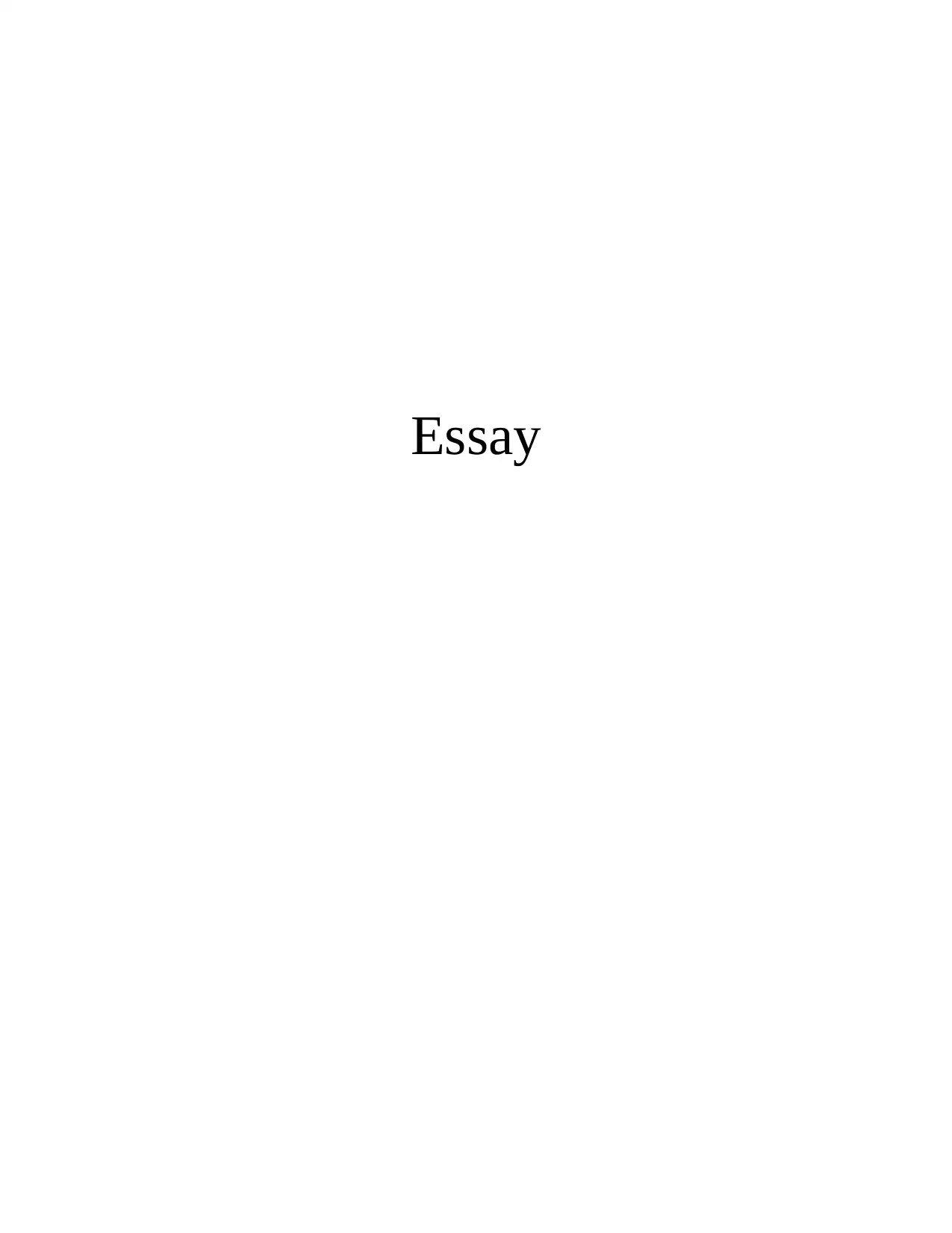
Essay
Paraphrase This Document
Need a fresh take? Get an instant paraphrase of this document with our AI Paraphraser
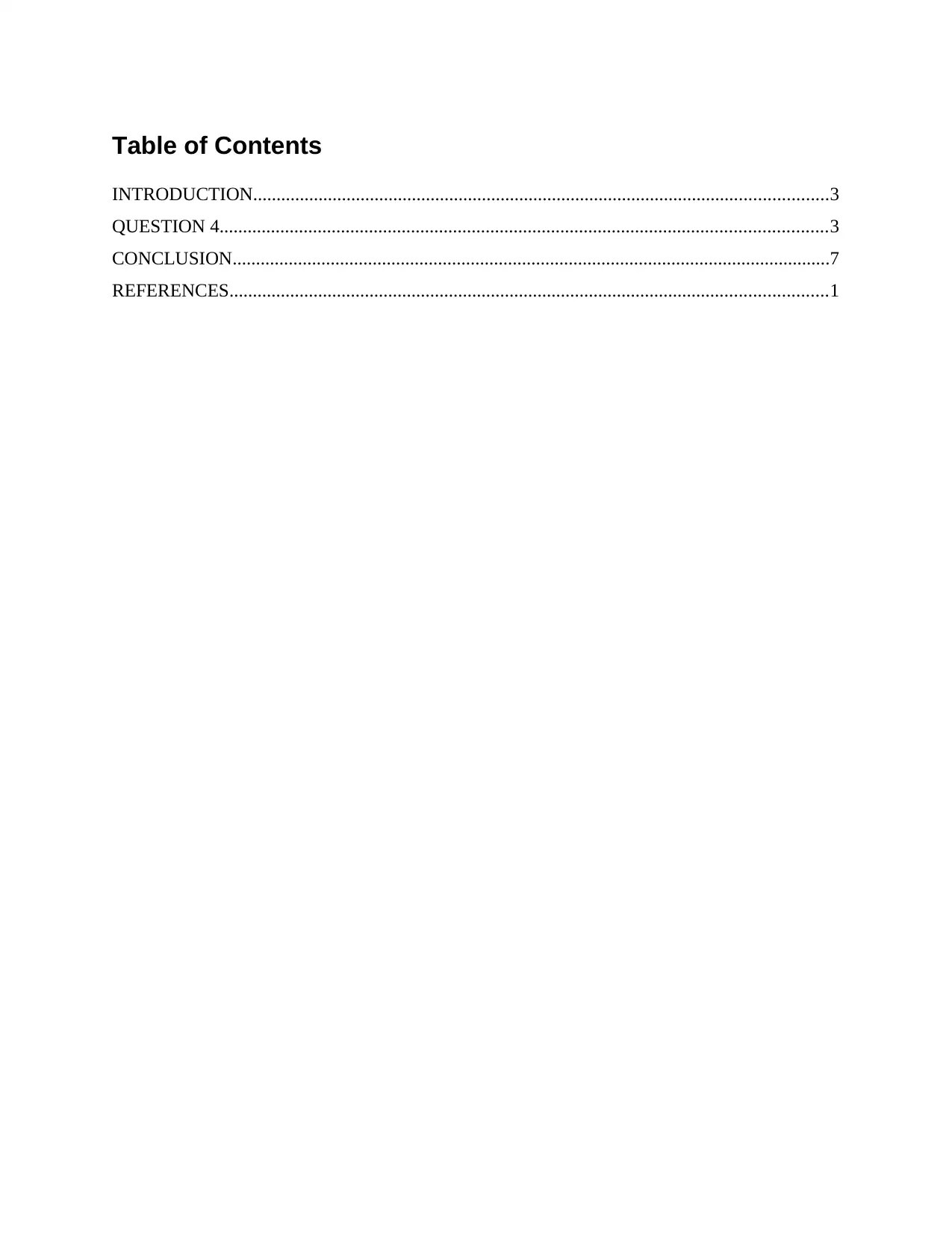
Table of Contents
INTRODUCTION...........................................................................................................................3
QUESTION 4..................................................................................................................................3
CONCLUSION................................................................................................................................7
REFERENCES................................................................................................................................1
INTRODUCTION...........................................................................................................................3
QUESTION 4..................................................................................................................................3
CONCLUSION................................................................................................................................7
REFERENCES................................................................................................................................1
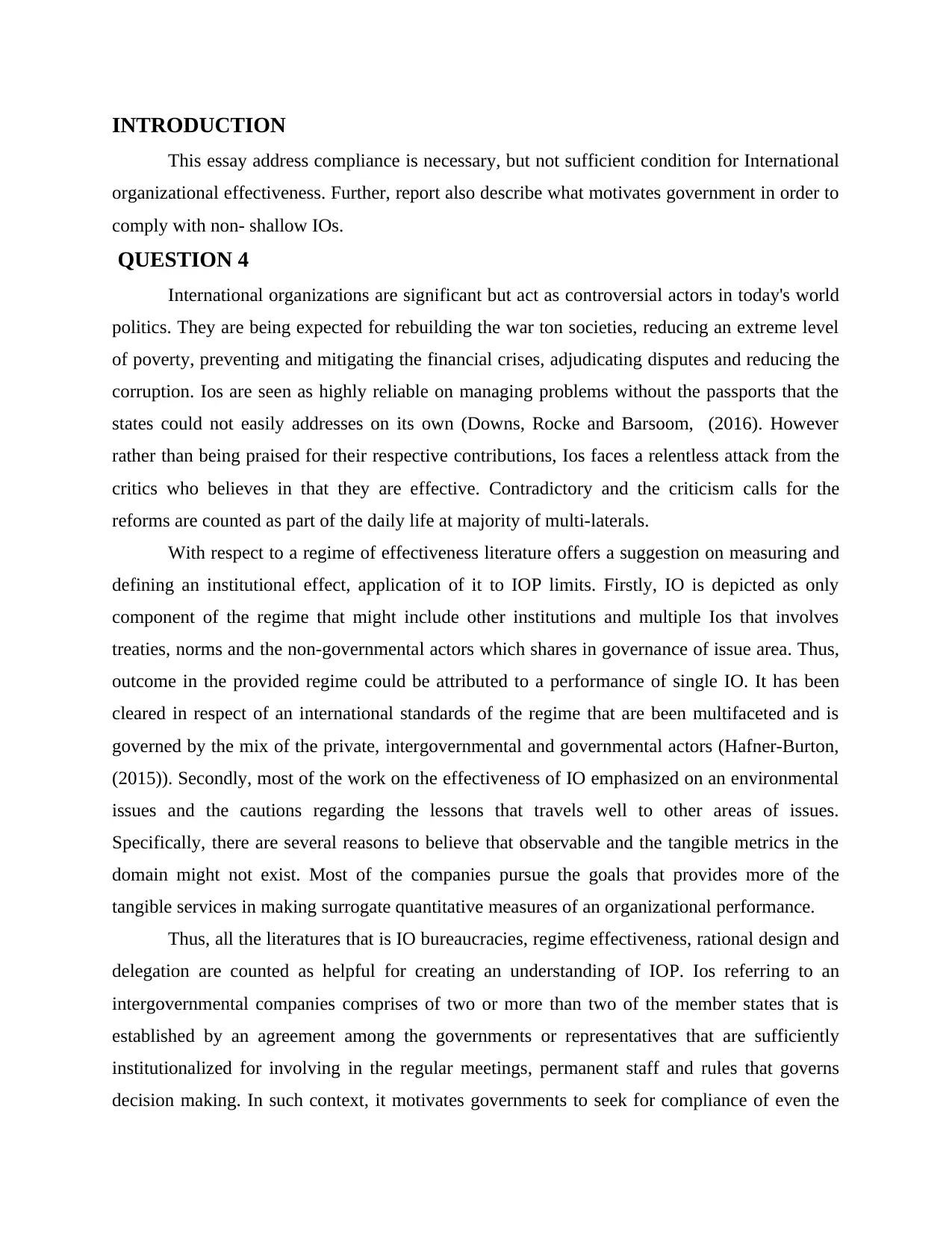
INTRODUCTION
This essay address compliance is necessary, but not sufficient condition for International
organizational effectiveness. Further, report also describe what motivates government in order to
comply with non- shallow IOs.
QUESTION 4
International organizations are significant but act as controversial actors in today's world
politics. They are being expected for rebuilding the war ton societies, reducing an extreme level
of poverty, preventing and mitigating the financial crises, adjudicating disputes and reducing the
corruption. Ios are seen as highly reliable on managing problems without the passports that the
states could not easily addresses on its own (Downs, Rocke and Barsoom, (2016). However
rather than being praised for their respective contributions, Ios faces a relentless attack from the
critics who believes in that they are effective. Contradictory and the criticism calls for the
reforms are counted as part of the daily life at majority of multi-laterals.
With respect to a regime of effectiveness literature offers a suggestion on measuring and
defining an institutional effect, application of it to IOP limits. Firstly, IO is depicted as only
component of the regime that might include other institutions and multiple Ios that involves
treaties, norms and the non-governmental actors which shares in governance of issue area. Thus,
outcome in the provided regime could be attributed to a performance of single IO. It has been
cleared in respect of an international standards of the regime that are been multifaceted and is
governed by the mix of the private, intergovernmental and governmental actors (Hafner-Burton,
(2015)). Secondly, most of the work on the effectiveness of IO emphasized on an environmental
issues and the cautions regarding the lessons that travels well to other areas of issues.
Specifically, there are several reasons to believe that observable and the tangible metrics in the
domain might not exist. Most of the companies pursue the goals that provides more of the
tangible services in making surrogate quantitative measures of an organizational performance.
Thus, all the literatures that is IO bureaucracies, regime effectiveness, rational design and
delegation are counted as helpful for creating an understanding of IOP. Ios referring to an
intergovernmental companies comprises of two or more than two of the member states that is
established by an agreement among the governments or representatives that are sufficiently
institutionalized for involving in the regular meetings, permanent staff and rules that governs
decision making. In such context, it motivates governments to seek for compliance of even the
This essay address compliance is necessary, but not sufficient condition for International
organizational effectiveness. Further, report also describe what motivates government in order to
comply with non- shallow IOs.
QUESTION 4
International organizations are significant but act as controversial actors in today's world
politics. They are being expected for rebuilding the war ton societies, reducing an extreme level
of poverty, preventing and mitigating the financial crises, adjudicating disputes and reducing the
corruption. Ios are seen as highly reliable on managing problems without the passports that the
states could not easily addresses on its own (Downs, Rocke and Barsoom, (2016). However
rather than being praised for their respective contributions, Ios faces a relentless attack from the
critics who believes in that they are effective. Contradictory and the criticism calls for the
reforms are counted as part of the daily life at majority of multi-laterals.
With respect to a regime of effectiveness literature offers a suggestion on measuring and
defining an institutional effect, application of it to IOP limits. Firstly, IO is depicted as only
component of the regime that might include other institutions and multiple Ios that involves
treaties, norms and the non-governmental actors which shares in governance of issue area. Thus,
outcome in the provided regime could be attributed to a performance of single IO. It has been
cleared in respect of an international standards of the regime that are been multifaceted and is
governed by the mix of the private, intergovernmental and governmental actors (Hafner-Burton,
(2015)). Secondly, most of the work on the effectiveness of IO emphasized on an environmental
issues and the cautions regarding the lessons that travels well to other areas of issues.
Specifically, there are several reasons to believe that observable and the tangible metrics in the
domain might not exist. Most of the companies pursue the goals that provides more of the
tangible services in making surrogate quantitative measures of an organizational performance.
Thus, all the literatures that is IO bureaucracies, regime effectiveness, rational design and
delegation are counted as helpful for creating an understanding of IOP. Ios referring to an
intergovernmental companies comprises of two or more than two of the member states that is
established by an agreement among the governments or representatives that are sufficiently
institutionalized for involving in the regular meetings, permanent staff and rules that governs
decision making. In such context, it motivates governments to seek for compliance of even the
⊘ This is a preview!⊘
Do you want full access?
Subscribe today to unlock all pages.

Trusted by 1+ million students worldwide
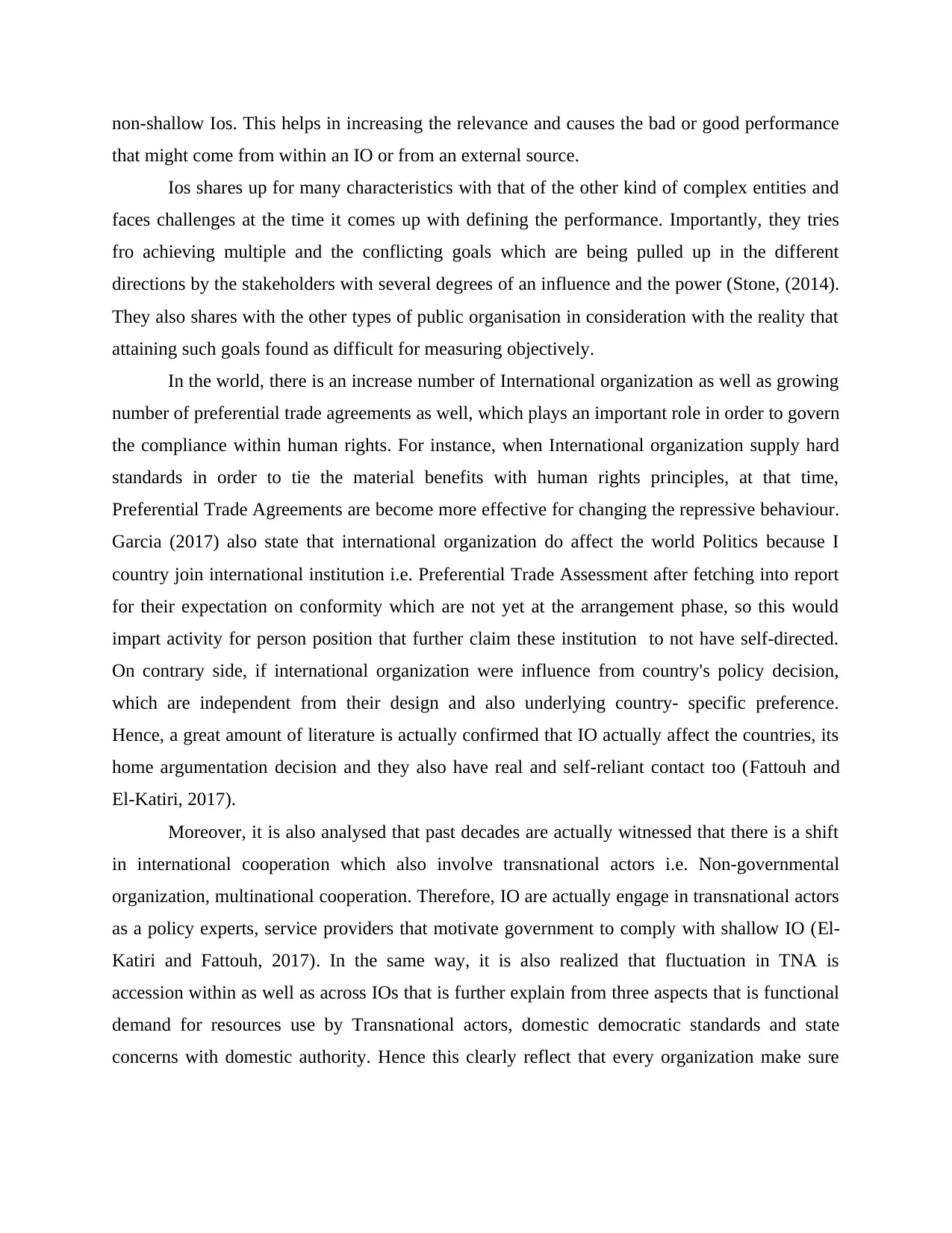
non-shallow Ios. This helps in increasing the relevance and causes the bad or good performance
that might come from within an IO or from an external source.
Ios shares up for many characteristics with that of the other kind of complex entities and
faces challenges at the time it comes up with defining the performance. Importantly, they tries
fro achieving multiple and the conflicting goals which are being pulled up in the different
directions by the stakeholders with several degrees of an influence and the power (Stone, (2014).
They also shares with the other types of public organisation in consideration with the reality that
attaining such goals found as difficult for measuring objectively.
In the world, there is an increase number of International organization as well as growing
number of preferential trade agreements as well, which plays an important role in order to govern
the compliance within human rights. For instance, when International organization supply hard
standards in order to tie the material benefits with human rights principles, at that time,
Preferential Trade Agreements are become more effective for changing the repressive behaviour.
Garcia (2017) also state that international organization do affect the world Politics because I
country join international institution i.e. Preferential Trade Assessment after fetching into report
for their expectation on conformity which are not yet at the arrangement phase, so this would
impart activity for person position that further claim these institution to not have self-directed.
On contrary side, if international organization were influence from country's policy decision,
which are independent from their design and also underlying country- specific preference.
Hence, a great amount of literature is actually confirmed that IO actually affect the countries, its
home argumentation decision and they also have real and self-reliant contact too (Fattouh and
El-Katiri, 2017).
Moreover, it is also analysed that past decades are actually witnessed that there is a shift
in international cooperation which also involve transnational actors i.e. Non-governmental
organization, multinational cooperation. Therefore, IO are actually engage in transnational actors
as a policy experts, service providers that motivate government to comply with shallow IO (El-
Katiri and Fattouh, 2017). In the same way, it is also realized that fluctuation in TNA is
accession within as well as across IOs that is further explain from three aspects that is functional
demand for resources use by Transnational actors, domestic democratic standards and state
concerns with domestic authority. Hence this clearly reflect that every organization make sure
that might come from within an IO or from an external source.
Ios shares up for many characteristics with that of the other kind of complex entities and
faces challenges at the time it comes up with defining the performance. Importantly, they tries
fro achieving multiple and the conflicting goals which are being pulled up in the different
directions by the stakeholders with several degrees of an influence and the power (Stone, (2014).
They also shares with the other types of public organisation in consideration with the reality that
attaining such goals found as difficult for measuring objectively.
In the world, there is an increase number of International organization as well as growing
number of preferential trade agreements as well, which plays an important role in order to govern
the compliance within human rights. For instance, when International organization supply hard
standards in order to tie the material benefits with human rights principles, at that time,
Preferential Trade Agreements are become more effective for changing the repressive behaviour.
Garcia (2017) also state that international organization do affect the world Politics because I
country join international institution i.e. Preferential Trade Assessment after fetching into report
for their expectation on conformity which are not yet at the arrangement phase, so this would
impart activity for person position that further claim these institution to not have self-directed.
On contrary side, if international organization were influence from country's policy decision,
which are independent from their design and also underlying country- specific preference.
Hence, a great amount of literature is actually confirmed that IO actually affect the countries, its
home argumentation decision and they also have real and self-reliant contact too (Fattouh and
El-Katiri, 2017).
Moreover, it is also analysed that past decades are actually witnessed that there is a shift
in international cooperation which also involve transnational actors i.e. Non-governmental
organization, multinational cooperation. Therefore, IO are actually engage in transnational actors
as a policy experts, service providers that motivate government to comply with shallow IO (El-
Katiri and Fattouh, 2017). In the same way, it is also realized that fluctuation in TNA is
accession within as well as across IOs that is further explain from three aspects that is functional
demand for resources use by Transnational actors, domestic democratic standards and state
concerns with domestic authority. Hence this clearly reflect that every organization make sure
Paraphrase This Document
Need a fresh take? Get an instant paraphrase of this document with our AI Paraphraser
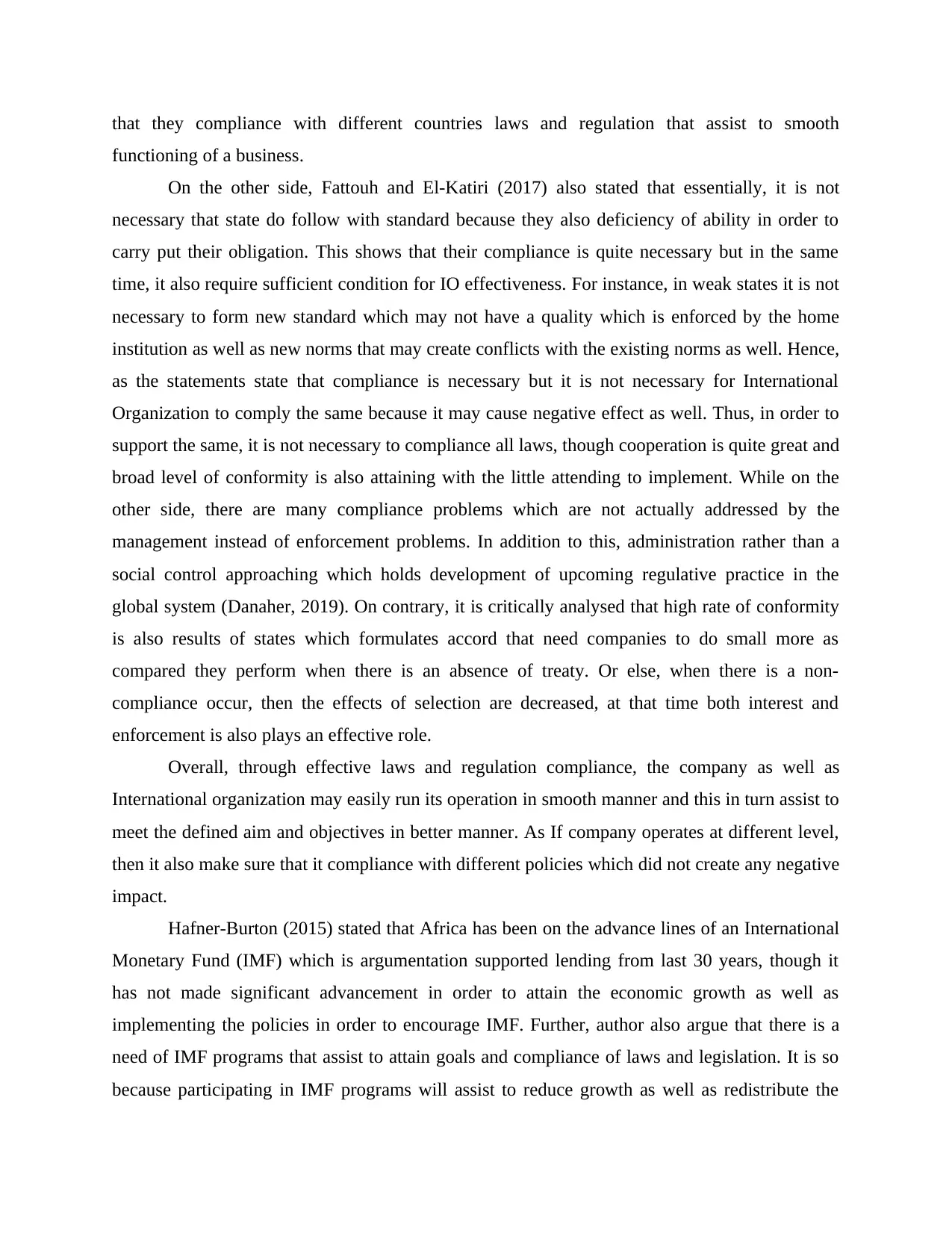
that they compliance with different countries laws and regulation that assist to smooth
functioning of a business.
On the other side, Fattouh and El-Katiri (2017) also stated that essentially, it is not
necessary that state do follow with standard because they also deficiency of ability in order to
carry put their obligation. This shows that their compliance is quite necessary but in the same
time, it also require sufficient condition for IO effectiveness. For instance, in weak states it is not
necessary to form new standard which may not have a quality which is enforced by the home
institution as well as new norms that may create conflicts with the existing norms as well. Hence,
as the statements state that compliance is necessary but it is not necessary for International
Organization to comply the same because it may cause negative effect as well. Thus, in order to
support the same, it is not necessary to compliance all laws, though cooperation is quite great and
broad level of conformity is also attaining with the little attending to implement. While on the
other side, there are many compliance problems which are not actually addressed by the
management instead of enforcement problems. In addition to this, administration rather than a
social control approaching which holds development of upcoming regulative practice in the
global system (Danaher, 2019). On contrary, it is critically analysed that high rate of conformity
is also results of states which formulates accord that need companies to do small more as
compared they perform when there is an absence of treaty. Or else, when there is a non-
compliance occur, then the effects of selection are decreased, at that time both interest and
enforcement is also plays an effective role.
Overall, through effective laws and regulation compliance, the company as well as
International organization may easily run its operation in smooth manner and this in turn assist to
meet the defined aim and objectives in better manner. As If company operates at different level,
then it also make sure that it compliance with different policies which did not create any negative
impact.
Hafner-Burton (2015) stated that Africa has been on the advance lines of an International
Monetary Fund (IMF) which is argumentation supported lending from last 30 years, though it
has not made significant advancement in order to attain the economic growth as well as
implementing the policies in order to encourage IMF. Further, author also argue that there is a
need of IMF programs that assist to attain goals and compliance of laws and legislation. It is so
because participating in IMF programs will assist to reduce growth as well as redistribute the
functioning of a business.
On the other side, Fattouh and El-Katiri (2017) also stated that essentially, it is not
necessary that state do follow with standard because they also deficiency of ability in order to
carry put their obligation. This shows that their compliance is quite necessary but in the same
time, it also require sufficient condition for IO effectiveness. For instance, in weak states it is not
necessary to form new standard which may not have a quality which is enforced by the home
institution as well as new norms that may create conflicts with the existing norms as well. Hence,
as the statements state that compliance is necessary but it is not necessary for International
Organization to comply the same because it may cause negative effect as well. Thus, in order to
support the same, it is not necessary to compliance all laws, though cooperation is quite great and
broad level of conformity is also attaining with the little attending to implement. While on the
other side, there are many compliance problems which are not actually addressed by the
management instead of enforcement problems. In addition to this, administration rather than a
social control approaching which holds development of upcoming regulative practice in the
global system (Danaher, 2019). On contrary, it is critically analysed that high rate of conformity
is also results of states which formulates accord that need companies to do small more as
compared they perform when there is an absence of treaty. Or else, when there is a non-
compliance occur, then the effects of selection are decreased, at that time both interest and
enforcement is also plays an effective role.
Overall, through effective laws and regulation compliance, the company as well as
International organization may easily run its operation in smooth manner and this in turn assist to
meet the defined aim and objectives in better manner. As If company operates at different level,
then it also make sure that it compliance with different policies which did not create any negative
impact.
Hafner-Burton (2015) stated that Africa has been on the advance lines of an International
Monetary Fund (IMF) which is argumentation supported lending from last 30 years, though it
has not made significant advancement in order to attain the economic growth as well as
implementing the policies in order to encourage IMF. Further, author also argue that there is a
need of IMF programs that assist to attain goals and compliance of laws and legislation. It is so
because participating in IMF programs will assist to reduce growth as well as redistribute the
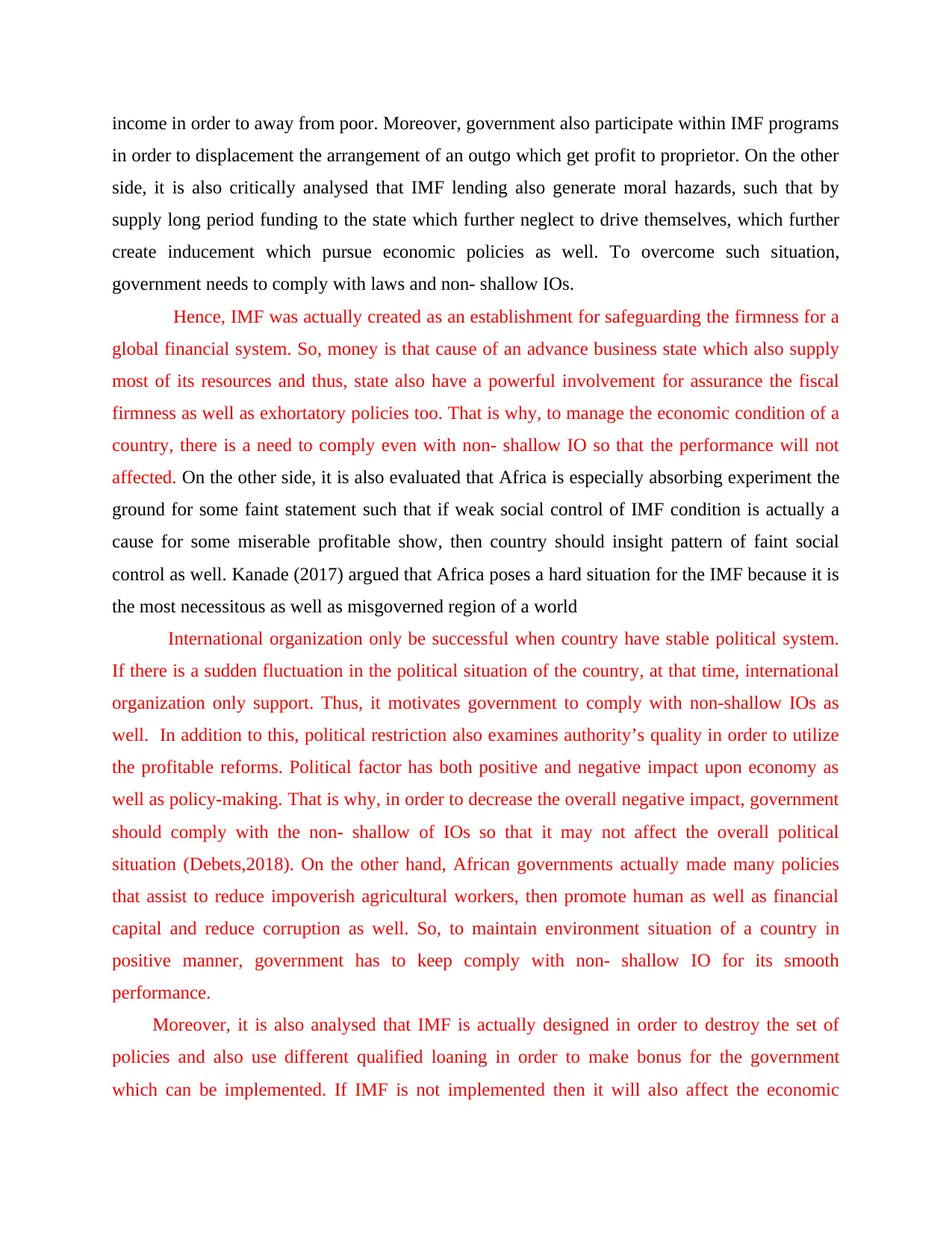
income in order to away from poor. Moreover, government also participate within IMF programs
in order to displacement the arrangement of an outgo which get profit to proprietor. On the other
side, it is also critically analysed that IMF lending also generate moral hazards, such that by
supply long period funding to the state which further neglect to drive themselves, which further
create inducement which pursue economic policies as well. To overcome such situation,
government needs to comply with laws and non- shallow IOs.
Hence, IMF was actually created as an establishment for safeguarding the firmness for a
global financial system. So, money is that cause of an advance business state which also supply
most of its resources and thus, state also have a powerful involvement for assurance the fiscal
firmness as well as exhortatory policies too. That is why, to manage the economic condition of a
country, there is a need to comply even with non- shallow IO so that the performance will not
affected. On the other side, it is also evaluated that Africa is especially absorbing experiment the
ground for some faint statement such that if weak social control of IMF condition is actually a
cause for some miserable profitable show, then country should insight pattern of faint social
control as well. Kanade (2017) argued that Africa poses a hard situation for the IMF because it is
the most necessitous as well as misgoverned region of a world
International organization only be successful when country have stable political system.
If there is a sudden fluctuation in the political situation of the country, at that time, international
organization only support. Thus, it motivates government to comply with non-shallow IOs as
well. In addition to this, political restriction also examines authority’s quality in order to utilize
the profitable reforms. Political factor has both positive and negative impact upon economy as
well as policy-making. That is why, in order to decrease the overall negative impact, government
should comply with the non- shallow of IOs so that it may not affect the overall political
situation (Debets,2018). On the other hand, African governments actually made many policies
that assist to reduce impoverish agricultural workers, then promote human as well as financial
capital and reduce corruption as well. So, to maintain environment situation of a country in
positive manner, government has to keep comply with non- shallow IO for its smooth
performance.
Moreover, it is also analysed that IMF is actually designed in order to destroy the set of
policies and also use different qualified loaning in order to make bonus for the government
which can be implemented. If IMF is not implemented then it will also affect the economic
in order to displacement the arrangement of an outgo which get profit to proprietor. On the other
side, it is also critically analysed that IMF lending also generate moral hazards, such that by
supply long period funding to the state which further neglect to drive themselves, which further
create inducement which pursue economic policies as well. To overcome such situation,
government needs to comply with laws and non- shallow IOs.
Hence, IMF was actually created as an establishment for safeguarding the firmness for a
global financial system. So, money is that cause of an advance business state which also supply
most of its resources and thus, state also have a powerful involvement for assurance the fiscal
firmness as well as exhortatory policies too. That is why, to manage the economic condition of a
country, there is a need to comply even with non- shallow IO so that the performance will not
affected. On the other side, it is also evaluated that Africa is especially absorbing experiment the
ground for some faint statement such that if weak social control of IMF condition is actually a
cause for some miserable profitable show, then country should insight pattern of faint social
control as well. Kanade (2017) argued that Africa poses a hard situation for the IMF because it is
the most necessitous as well as misgoverned region of a world
International organization only be successful when country have stable political system.
If there is a sudden fluctuation in the political situation of the country, at that time, international
organization only support. Thus, it motivates government to comply with non-shallow IOs as
well. In addition to this, political restriction also examines authority’s quality in order to utilize
the profitable reforms. Political factor has both positive and negative impact upon economy as
well as policy-making. That is why, in order to decrease the overall negative impact, government
should comply with the non- shallow of IOs so that it may not affect the overall political
situation (Debets,2018). On the other hand, African governments actually made many policies
that assist to reduce impoverish agricultural workers, then promote human as well as financial
capital and reduce corruption as well. So, to maintain environment situation of a country in
positive manner, government has to keep comply with non- shallow IO for its smooth
performance.
Moreover, it is also analysed that IMF is actually designed in order to destroy the set of
policies and also use different qualified loaning in order to make bonus for the government
which can be implemented. If IMF is not implemented then it will also affect the economic
⊘ This is a preview!⊘
Do you want full access?
Subscribe today to unlock all pages.

Trusted by 1+ million students worldwide
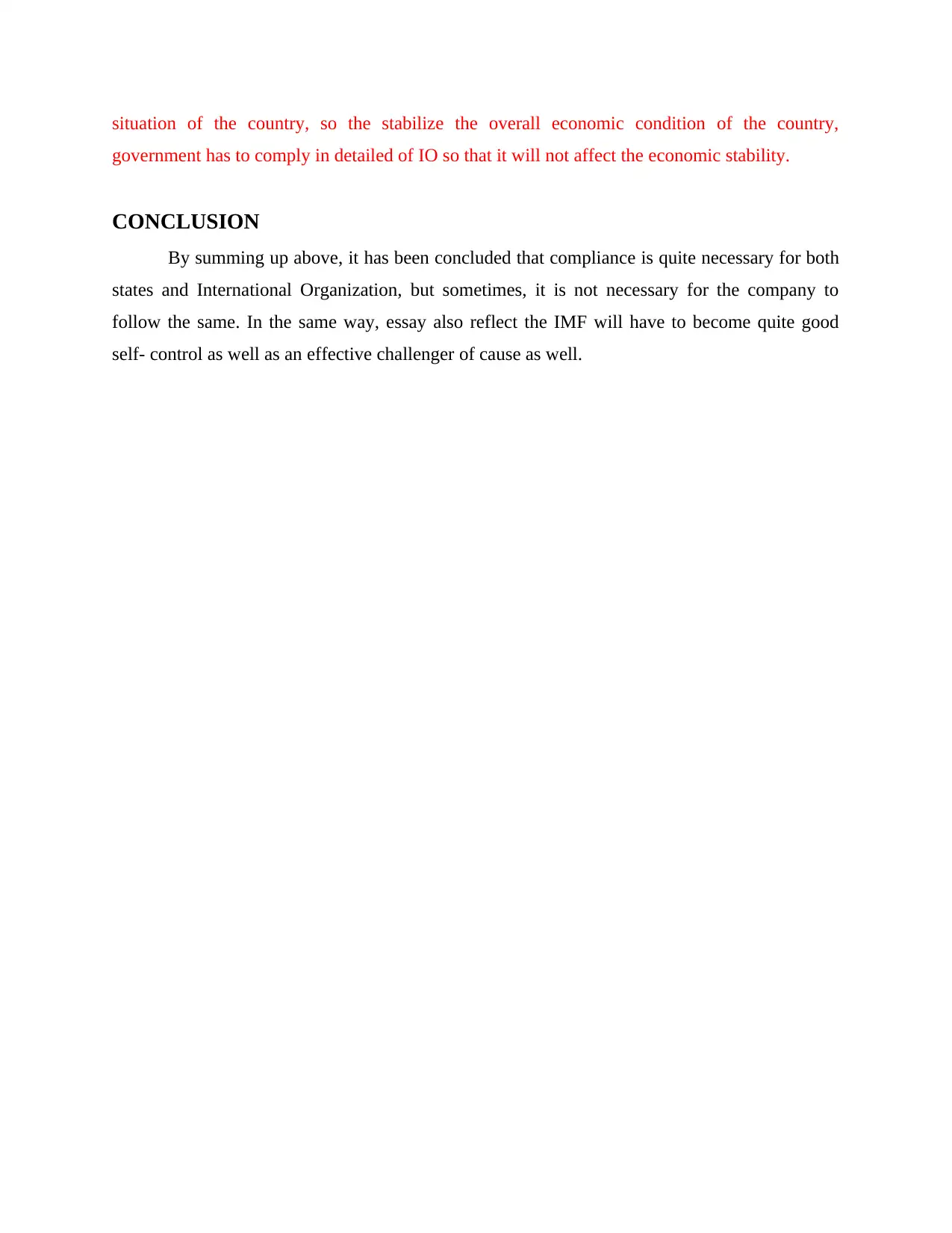
situation of the country, so the stabilize the overall economic condition of the country,
government has to comply in detailed of IO so that it will not affect the economic stability.
CONCLUSION
By summing up above, it has been concluded that compliance is quite necessary for both
states and International Organization, but sometimes, it is not necessary for the company to
follow the same. In the same way, essay also reflect the IMF will have to become quite good
self- control as well as an effective challenger of cause as well.
government has to comply in detailed of IO so that it will not affect the economic stability.
CONCLUSION
By summing up above, it has been concluded that compliance is quite necessary for both
states and International Organization, but sometimes, it is not necessary for the company to
follow the same. In the same way, essay also reflect the IMF will have to become quite good
self- control as well as an effective challenger of cause as well.
Paraphrase This Document
Need a fresh take? Get an instant paraphrase of this document with our AI Paraphraser
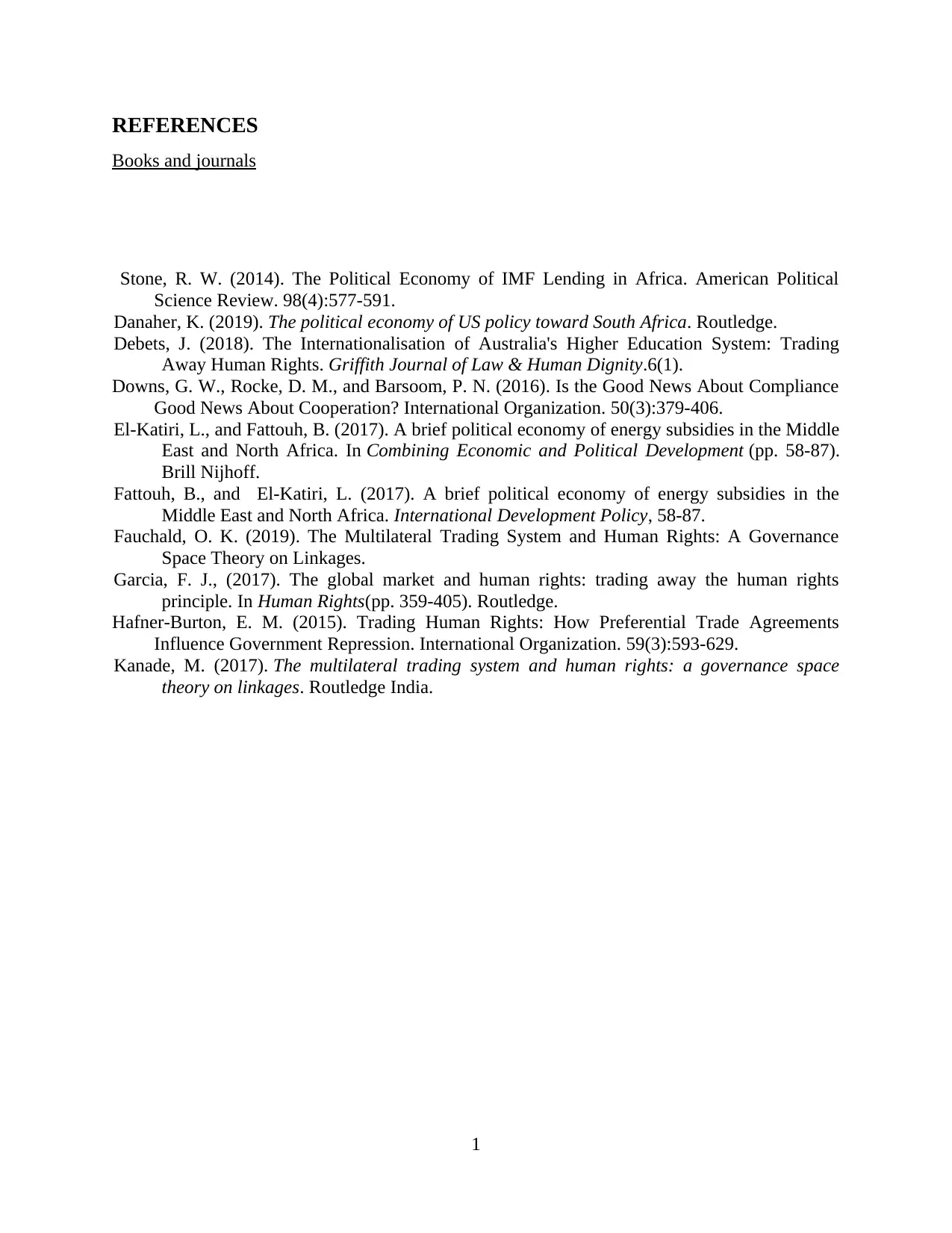
REFERENCES
Books and journals
Stone, R. W. (2014). The Political Economy of IMF Lending in Africa. American Political
Science Review. 98(4):577-591.
Danaher, K. (2019). The political economy of US policy toward South Africa. Routledge.
Debets, J. (2018). The Internationalisation of Australia's Higher Education System: Trading
Away Human Rights. Griffith Journal of Law & Human Dignity.6(1).
Downs, G. W., Rocke, D. M., and Barsoom, P. N. (2016). Is the Good News About Compliance
Good News About Cooperation? International Organization. 50(3):379-406.
El-Katiri, L., and Fattouh, B. (2017). A brief political economy of energy subsidies in the Middle
East and North Africa. In Combining Economic and Political Development (pp. 58-87).
Brill Nijhoff.
Fattouh, B., and El-Katiri, L. (2017). A brief political economy of energy subsidies in the
Middle East and North Africa. International Development Policy, 58-87.
Fauchald, O. K. (2019). The Multilateral Trading System and Human Rights: A Governance
Space Theory on Linkages.
Garcia, F. J., (2017). The global market and human rights: trading away the human rights
principle. In Human Rights(pp. 359-405). Routledge.
Hafner-Burton, E. M. (2015). Trading Human Rights: How Preferential Trade Agreements
Influence Government Repression. International Organization. 59(3):593-629.
Kanade, M. (2017). The multilateral trading system and human rights: a governance space
theory on linkages. Routledge India.
1
Books and journals
Stone, R. W. (2014). The Political Economy of IMF Lending in Africa. American Political
Science Review. 98(4):577-591.
Danaher, K. (2019). The political economy of US policy toward South Africa. Routledge.
Debets, J. (2018). The Internationalisation of Australia's Higher Education System: Trading
Away Human Rights. Griffith Journal of Law & Human Dignity.6(1).
Downs, G. W., Rocke, D. M., and Barsoom, P. N. (2016). Is the Good News About Compliance
Good News About Cooperation? International Organization. 50(3):379-406.
El-Katiri, L., and Fattouh, B. (2017). A brief political economy of energy subsidies in the Middle
East and North Africa. In Combining Economic and Political Development (pp. 58-87).
Brill Nijhoff.
Fattouh, B., and El-Katiri, L. (2017). A brief political economy of energy subsidies in the
Middle East and North Africa. International Development Policy, 58-87.
Fauchald, O. K. (2019). The Multilateral Trading System and Human Rights: A Governance
Space Theory on Linkages.
Garcia, F. J., (2017). The global market and human rights: trading away the human rights
principle. In Human Rights(pp. 359-405). Routledge.
Hafner-Burton, E. M. (2015). Trading Human Rights: How Preferential Trade Agreements
Influence Government Repression. International Organization. 59(3):593-629.
Kanade, M. (2017). The multilateral trading system and human rights: a governance space
theory on linkages. Routledge India.
1
1 out of 8
Your All-in-One AI-Powered Toolkit for Academic Success.
+13062052269
info@desklib.com
Available 24*7 on WhatsApp / Email
![[object Object]](/_next/static/media/star-bottom.7253800d.svg)
Unlock your academic potential
Copyright © 2020–2025 A2Z Services. All Rights Reserved. Developed and managed by ZUCOL.